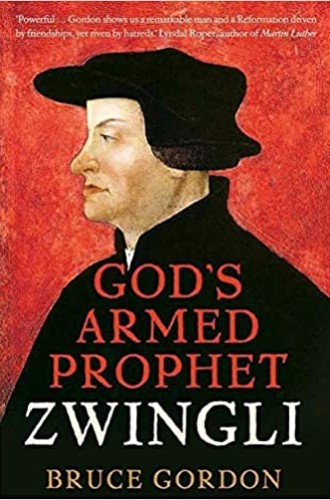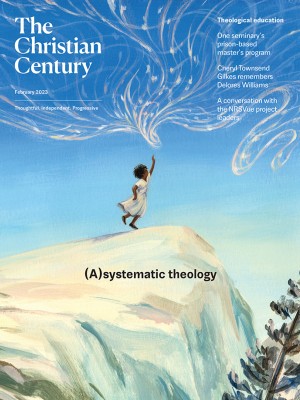Bringing Zwingli out from the shadows of Luther and Calvin
Bruce Gordon masterfully weaves together the world that shaped the least-remembered Reformer and the ways he shaped that world.
Often the readership of a biography is limited by the name recognition of its subject, and here we find Zwingli: God’s Armed Prophet at a disadvantage. If you need to be reminded of who Ulrich Zwingli was—or if you never knew—don’t feel ashamed. At best, you probably learned of him as a foil to Martin Luther or precursor to John Calvin in a course long ago, the books for which you quickly off-loaded when the term finished. Perhaps you have a vague memory of debate at Marburg, a death at Kappel, or something called the Affair of the Sausages.
Zwingli’s career as a Reformer was short, and his ignominious death left little in the way of a following to establish a legacy like some of his contemporaries and followers enjoy. There are Lutherans and Calvinists but no Zwinglians (except those Lutheran seminarians accused of secretly being crypto-Calvinists for having spoken too imprecisely regarding the real presence of Christ in the Eucharist). In short, Zwingli’s legacy is not claimed by many today, however he might have shaped them.
Read our latest issue or browse back issues.
By Bruce Gordon’s own admission, these difficulties are at the center of the challenge he accepts in taking on the task of chronicling the life of Zwingli. Rescuing Zwingli from both general obscurity and the shadows of Luther and Calvin is no trivial affair. Yet Gordon does just that, and expertly so.
What emerges is a fully fleshed portrait of Zwingli that illuminates many aspects of his life and work, some which have been the focus of sustained interest and others which have too long been neglected by scholars. Those interested in Zwingli’s contributions to theology will find here the framework necessary to ground his thought in his life. Those rightly clamoring for less gilded recountings of the past will be heartened that Gordon does not shy away from tackling head-on the condemnable aspects of Zwingli’s character, such as his notable misogyny and his animus toward Jews. Zwingli’s complexity is presented here, but not at the expense of clarity in writing or thought. The result should be considered a new benchmark for biographies of Zwingli across all languages. It’s simply that good.
Were this merely an excellent biography, we could stop the review here. But Zwingli is something more. What makes it a worthwhile read for an audience wider than Reformation enthusiasts or Zwingli-heads is the way in which Gordon tells more than just the story of Zwingli’s career. What gives shape to the life of Zwingli is Gordon’s sweeping expertise in the Swiss Reformation and the political and cultural currents that shaped it. For those who have read his 2002 work, The Swiss Reformation, nothing less would be expected. Yet even for those who saw it coming, Zwingli is a remarkable accomplishment for how thoroughly Gordon has intertwined an account of Zwingli’s life with the broader history of the people and movements that surrounded and shaped him.
It is difficult to describe the mastery needed to give a portrait of a subject’s background as rich as the subject without losing focus or creating a distraction, but that is what Gordon has accomplished here. He carries the reader’s attention back and forth from the world that shaped Zwingli to the ways he shaped his world. It is one thing to observe in Zwingli’s early writings commentaries on the mercenary trade, for example, or shifting opinions on the papacy. It’s another to weave those aspects of his career with the larger histories of what was happening around them in a way that truly opens up a compelling narrative of how Zwingli came to the helm of the Reformation in Zurich and gave it shape.
The fruit of Gordon’s efforts is a book that offers an insightful look into not only Zwingli’s life and times but our own. By this, I do not mean to malign Zwingli by associating it with that genre of polemic that wears biography like a wolf would sheep’s clothing. What Gordon has done could not be further from, say, Eric Metaxas’s revisionist portrayal of Dietrich Bonhoeffer as an American evangelical or Michael Massing’s myopic portrayal of the conflict between Luther and Erasmus as a forecast of a clash between Donald Trump and establishment liberalism. Far from molding Zwingli’s life into a commentary on present events or using it as a lens to make sense of our current moment, Gordon’s telling of Zwingli’s life is a master example of how the tools of the historian can be used to make sense of the life of an individual within systems far greater than themselves and, in turn, get at what the life of an individual can mean even in the midst of far greater forces.
Zwingli was just one person, caught up in forces much larger than himself, many of which would have seemed beyond contention. Yet, as Zwingli: God’s Armed Prophet evinces, the life Zwingli lived, however humble in origin and brief in length, left an enduring mark on a city, a confederacy, and indeed Christianity itself. He did very little alone, and what he did was built with a network of co-Reformers, supporters, and allies of convenience. And yet it is hard to say that what took place was so inevitable that it would have happened without him. To those of us seeking the vantage point to assess what is possible in our own day, Gordon’s work offers, by way of case study, instruction in how to discern the value of a life lived in and through systems much larger than itself.
There is, of course, a great difference between doing such work in assessing a past life and doing it in one’s own. But the past is an instructor we cannot do without, and with Zwingli, Gordon gives us a lesson as indispensable as the life of the man himself.






